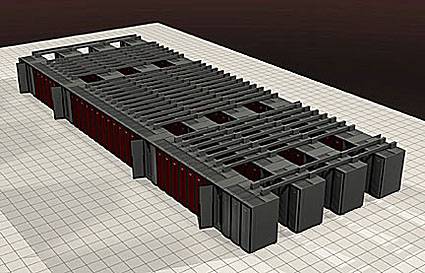Taming the Wild Supercomputer
Make 'em Big, Noisy And Impossible To Relocate
Large systems require costly, power-hungry, environmentally-controlled computer rooms. This is because cooling methods and system hardware take up significant volumes of space and require an environment that nearly meets clean-room standards. Normally, space is not a consideration. However, as performance requirements demand larger systems, and interconnect fabrics and speeds become faster and faster, interconnect lengths need to be kept as short as possible.
This can be a real problem in traditional computer rooms because of the distance between racks of computing components. In addition, environmentally controlled computer rooms often require that systems are fixed in place; systems cannot easily be replaced or transported. This becomes a significant problem when a large cluster needs to be quickly replaced or moved after a natural disaster. Also, many applications such as those found in intelligence and geological operations, need to be located in close proximity to the problem area.
Sandia Red Storm Supercomputer
The size of a system has an effect on power and heat. As size decreases, the power and heat density increases. Power density isn't problematic, at least within reason. However, increasing heat density does intensify problems. Sooner rather than later, fans, heat pipes, etc., just don't work. The person who finds creative solutions to heat density has a tiger by the tail. I hope that person is me. I could use the money.
The portability of supercomputers has a further reaching effect than a first glance warrants. Computers became widely popular when PCs were invented. That brought computing to the masses. The state of computer art took giant leaps forward because everyone and their uncle had good ideas and were given a chance to implement them. Many entrepreneurs arose due to natural market selection. The same would be true today with supercomputers, if only they could be popularized in an office environment.
Size, at the very least, keeps supercomputers out of the office. This doesn't have to be the case. Entrepreneurs, stand up and create! The only obstacles are non-technical; preconceptions need to be changed. The "if its not broke, don't fix it" philosophy makes it difficult to accept workable, creative solutions that can put supercomputers in the office.
Get Tom's Hardware's best news and in-depth reviews, straight to your inbox.
Current page: Make 'em Big, Noisy And Impossible To Relocate
Prev Page Ignore Power And Heat Next Page Customize The Operating System